Sorted by date Results 60 - 84 of 255

In the waning days of The War Between The States that occurred from 1861 through 1865, it became evident that after four years of fighting with fewer resources and fewer soldiers, that The South was crippled to its knees and a surrender was imminent. Nevertheless, a mere five days before General Robert E. Lee's surrender at Appomattox, General John T. Croxton led union troops in completing their march to The University of Alabama and burning it to the ground. Only four buildings were spared,...

🇺🇸 On August 11, 1972, the United States formally ended its ground combat operations in South Vietnam with the departure of the 3rd Battalion, 21st Infantry-nicknamed "The Gimlets"-from Da Nang. This moment marked a pivotal shift in the Vietnam War, signaling the beginning of the end of direct American military involvement in Southeast Asia. The Final Withdrawal The 3rd Battalion had been stationed at Da Nang, providing security for the U.S. air base and surrounding military insta...

On August 9, 1945, the Japanese city of Nagasaki was devastated by the second atomic bomb ever used in warfare. Dropped just three days after the bombing of Hiroshima, the plutonium-based "Fat Man" bomb instantly killed tens of thousands and left a legacy of suffering, resilience, and global reckoning. As the world marks the 80th anniversary of this event, the story of Nagasaki remains a powerful reminder of the human cost of nuclear warfare and the enduring call for peace. The Mission and the...

On August 8, 1647, English Parliamentary forces under Colonel Michael Jones decisively defeated the Irish Confederate Leinster army led by General Thomas Preston at Dungan's Hill in County Meath. The battle was a turning point in the Irish Confederate Wars, effectively crippling the Confederate military presence in eastern Ireland and paving the way for the Cromwellian conquest. Strategic Context • Wars of the Three Kingdoms: A series of interconnected conflicts in England, Scotland, and I...
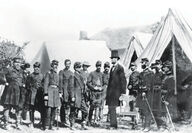
Lincoln claimed the North was fighting to preserve the Union. However, fighting to preserve a voluntary Union is a contradiction since force is antithetical to voluntary consent. Alexander Hamilton noted: “To coerce the States is one of the maddest projects that was ever devised…Can any reasonable man be well disposed toward a government which makes war and carnage the only means of supporting itself; a government that can exist only by the sword?” The New England power structure did just that....

If you don’t know the answer to this question, or even if you had to think about it for awhile, you’ve proven my point: The Korean War (June 1950 – July 1953) is America’s forgotten conflict. Of all the memorials on the Washington Mall, the Korean War Memorial is my favorite. In graphic detail, larger than life, it depicts in stainless steel 19 gaunt American soldiers in full battle dress as they grimly ascend a hill to commence an attack. Instead of being bunched together, they are spaced...
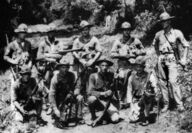
On August 14, 1912, United States Marines landed in Nicaragua, marking the beginning of a prolonged military occupation that would last, in various forms, until 1933. The intervention was part of a broader series of U.S. military actions in Latin America known as the Banana Wars, aimed at securing American political and commercial interests in the region. Background: Zelaya's Fall and U.S. Influence The roots of the invasion trace back to José Santos Zelaya, Nicaragua's Liberal president from...

On August 15, 778, deep in the Pyrenees between modern-day France and Spain, a Frankish rearguard led by the noble Roland met its end in a narrow mountain pass. The Battle of Roncevaux Pass, though a tactical defeat for Charlemagne's forces, became one of the most mythologized events in medieval European history-immortalized in epic poetry and shaping the ideals of chivalry for centuries to come. Charlemagne's Ambitions in Iberia The battle occurred during Charlemagne's campaign into the Iberian...

On August 16, 1841, President John Tyler stunned his own party and the nation by vetoing a bill to re-establish the Second Bank of the United States. The fallout was immediate and explosive. Within days, enraged members of the Whig Party gathered outside the White House in what became the most violent protest ever held on its grounds - firing guns, hurling stones, and burning Tyler in effigy. The riot marked a turning point in Tyler's presidency and exposed deep fractures within the Whig Party,...

On August 16, 1780, the quiet crossroads town of Camden, South Carolina became the site of one of the most devastating defeats for the Continental Army during the American Revolutionary War. The Battle of Camden was not merely a clash of arms-it was a collision of leadership styles, tactical misjudgments, and the brutal realities of 18th-century warfare. At the heart of the disaster were the officers whose decisions and valor shaped the outcome. Strategic Context: The Southern Campaign...

On August 17, 1945, in a modest house in Jakarta, two men-Sukarno and Mohammad Hatta-stood before a small crowd and read a brief but seismic declaration: "We, the people of Indonesia, hereby declare the independence of Indonesia." With that statement, the archipelago's centuries-long subjugation under foreign powers-from Portuguese traders to Dutch colonizers-was formally rejected. But the proclamation was not the end of struggle; it was the beginning of a bloody, four-year revolution against...
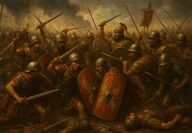
In the scorching heat of an Apulian summer in 216 BC, the course of military history was forever altered when the Carthaginian general Hannibal Barca annihilated a vastly larger Roman force in the Battle of Cannae, one of the most studied engagements in tactical warfare. Fought during the Second Punic War between Carthage and Rome, Cannae demonstrated both the brilliance of strategic envelopment and the vulnerability of rigid command structures in the face of innovation. At the time, Hannibal...

On July 31, 904, the Byzantine city of Thessalonica-second only to Constantinople in wealth and prestige-was engulfed in one of the most devastating assaults of the Arab–Byzantine Wars. Led by the renegade Greek convert to Islam, Leo of Tripoli, a fleet of 54 Saracen ships descended upon the city with brutal efficiency, leaving behind a trail of destruction, death, and despair. Thessalonica, a cosmopolitan hub with a deep harbor and fertile hinterlands, had long enjoyed peace and prosperity. B...

On July 22, 1298, the fields outside the Scottish town of Falkirk bore witness to one of the most significant-and devastating-clashes of the Wars of Scottish Independence. The Battle of Falkirk saw English King Edward I, the formidable "Hammer of the Scots," lead his archers and cavalry against the determined but outmatched forces commanded by the Scottish Guardian, Sir William Wallace. The encounter, marked most notably by the lethal effectiveness of the English longbowmen against the...

On August 1, 30 BC, Octavian-soon to be known as Augustus, Rome's first emperor-entered the ancient city of Alexandria, Egypt, marking a decisive moment in world history. This event not only sealed the fate of Mark Antony and Cleopatra, but also signaled the end of the Roman Republic and the beginning of the Roman Empire. The annexation of Egypt transformed Rome's geopolitical landscape and ushered in a new era of imperial rule. Prelude to Conquest: The Road to Alexandria The capture of...

On August 2, 1990, the international community awoke to alarming news: Iraqi President Saddam Hussein had ordered a full-scale invasion of neighboring Kuwait. The swift military operation stunned observers worldwide, rapidly morphing from a border dispute into a global crisis. The consequences would reverberate for decades, as the Gulf War marked a decisive moment in the reshaping of Middle Eastern power dynamics and U.S. foreign policy engagement. Backdrop of Tension Iraq's invasion wasn't...

Introduction On July 24, 1411, the lush fields near Inverurie in Aberdeenshire turned into one of the bloodiest battlegrounds in Scottish medieval history. The Battle of Harlaw was more than a violent regional skirmish-it was a decisive moment that shaped the political future of the Scottish Highlands and Lowlands. Historical Context The conflict stemmed from a contested inheritance. The Lordship of the Isles, a semi-autonomous Gaelic-Norse domain in western Scotland, was ruled by Donald of...

PETERSBURG, Va. - In one of the Civil War's most audacious and tragic episodes, Union forces detonated a massive underground mine beneath Confederate lines at Petersburg on July 30, 1864, hoping to break the stalemate of trench warfare and seize the strategic rail hub. The resulting explosion created a gaping crater and momentarily stunned Confederate defenders - but poor planning and leadership turned the opportunity into a devastating Union defeat. The Plan: Mining Under the Enemy The idea...

WASHINGTON, D.C. - On July 29, 1958, President Dwight D. Eisenhower signed the National Aeronautics and Space Act into law, officially establishing the National Aeronautics and Space Administration (NASA). The landmark legislation marked a turning point in American science and technology, ushering in a new era of civilian-led space exploration. The Act was born out of urgency and ambition. Just months earlier, the Soviet Union had stunned the world with the launch of Sputnik 1, the first...

On August 3, 1934, a seismic shift occurred in the political landscape of Germany. Adolf Hitler, already Chancellor of the German Reich, moved swiftly to consolidate ultimate authority by merging the roles of President and Chancellor into a new position-Führer und Reichskanzler (Leader and Reich Chancellor). This marked the culmination of Hitler's rise from party agitator to unchallenged ruler, effectively dismantling the last remaining checks on his power. The Context: Death of President Hinden...
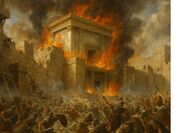
The destruction of the Second Temple in Jerusalem on August 4, 70 AD by Roman forces marked one of the most devastating and transformative events in Jewish history. It was not just the loss of a building but the collapse of an entire way of life-religiously, socially, and politically. As flames engulfed the sacred site, centuries of tradition were reduced to rubble, and the Jewish people faced a turning point that would reshape their identity for generations. Historical Background: The First Jew...
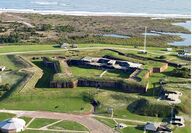
On August 5, 1864, the Union Navy launched one of its most daring and consequential assaults of the American Civil War: the Battle of Mobile Bay. Led by Rear Admiral David G. Farragut, the Union flotilla stormed through Confederate defenses guarding the entrance to Mobile Bay, Alabama, sealing off one of the last major Southern ports and delivering a strategic blow to the Confederacy's Gulf Coast operations. The battle was not merely a naval engagement-it was a calculated assault on a fortified...

On the morning of August 6, 1945, the Japanese city of Hiroshima awoke to a clear summer sky. By 8:15 a.m., that sky was torn apart by a blinding flash of light and a thunderous roar that would echo through history. The United States B-29 bomber Enola Gay had just released "Little Boy," the world's first atomic bomb used in warfare. In an instant, Hiroshima was transformed from a bustling urban center into a smoldering wasteland. Approximately 70,000 people were killed immediately, and tens of...
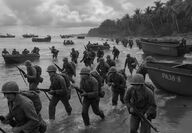
August 7, 1942 – February 9, 1943 Guadalcanal, Solomon Islands The Battle of Guadalcanal was the United States' first major offensive in the Pacific Theater of World War II. It was a campaign born of urgency and executed with grit, marking the moment when the Allies seized the strategic initiative from Imperial Japan. Over six months, American forces fought a brutal land, sea, and air campaign that would become a crucible of modern warfare. Strategic Imperatives and the Opening Assault By m...

On August 26, 55 BC, Julius Caesar stood on the shores of Gaul, gazing across the narrow waters of the English Channel toward a land that had long intrigued Roman minds but remained unconquered. That day marked the beginning of Rome's first military incursion into Britain-a bold and symbolic maneuver that would echo through centuries of imperial ambition, cultural exchange, and historical mythmaking. The Political Winds Behind the Crossing Caesar's decision to invade Britain wasn't purely...